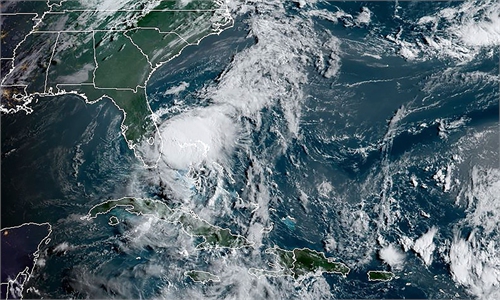Emergency crews in central Florida were working Sunday to prevent an environmental catastrophe at a leaking reservoir that risked sending millions of gallons of contaminated wastewater toward nearby homes and into the Tampa Bay.

"What we are looking at now is trying to prevent, and respond to if need be, a real catastrophic flood situation," DeSantis told a press conference after viewing the site by helicopter Sunday. He said emergency workers, assisted by the Florida National Guard, were pumping about 33 million gallons of water daily out of a wastewater reservoir at the site, which has sprung a growing leak in its plastic lining. "According to on-site engineers, a controlled release was necessary to prevent a catastrophic failure," the governor said.
The wastewater "meets water-quality standards for marine waters," he said, with the exception of phosphorous and nitrogen levels. Marine algae thrive on such elements, and environmental groups fear the release of millions of gallons of nutrient-rich water into the ocean could trigger a deadly "red tide," or algal bloom, that can suffocate fish and other aquatic life and deter tourist activity.
Manatee County's acting administrator Scott Hopes said inmates and staff at the local jail had been moved to the second floor of the two-story building as a precaution.
Hopes sounded a slightly more optimistic note later Sunday, saying the situation should be in a "much better position" by Tuesday. But "we are not out of the critical area yet," he warned.
A collapse of the reservoir also risked sending water into nearby stacks of phosphogypsum, a leftover from fertilizer production. Phosphogypsum is considered radioactive as it contains isotopes such as radon, and toxic heavy metals like arsenic, lead and mercury.
The Center for Biological Diversity national conservation group called for the US Environmental Protection Agency to step in. "Federal officials need to clean up this mess the fertilizer industry has dumped on Florida communities and immediately halt further phosphogypsum production," said Jaclyn Lopez, the organization's Florida director.

Ron DeSantis, Governor Ron DeSantis tours the area over Piney Point after an emergency was declared after a leaking toxic wastewater reservoir, threatened nearby homes and an environmental disaster, near Tampa Bay, Florida on April 4. Photo: VCG
More than 300 homes near the site of an abandoned phosphate mine and fertilizer-production facility in Manatee County were under mandatory evacuation orders, and Governor Ron DeSantis on Saturday declared a state of emergency to free up funds to tackle the crisis."What we are looking at now is trying to prevent, and respond to if need be, a real catastrophic flood situation," DeSantis told a press conference after viewing the site by helicopter Sunday. He said emergency workers, assisted by the Florida National Guard, were pumping about 33 million gallons of water daily out of a wastewater reservoir at the site, which has sprung a growing leak in its plastic lining. "According to on-site engineers, a controlled release was necessary to prevent a catastrophic failure," the governor said.
The wastewater "meets water-quality standards for marine waters," he said, with the exception of phosphorous and nitrogen levels. Marine algae thrive on such elements, and environmental groups fear the release of millions of gallons of nutrient-rich water into the ocean could trigger a deadly "red tide," or algal bloom, that can suffocate fish and other aquatic life and deter tourist activity.
Manatee County's acting administrator Scott Hopes said inmates and staff at the local jail had been moved to the second floor of the two-story building as a precaution.
Hopes sounded a slightly more optimistic note later Sunday, saying the situation should be in a "much better position" by Tuesday. But "we are not out of the critical area yet," he warned.
A collapse of the reservoir also risked sending water into nearby stacks of phosphogypsum, a leftover from fertilizer production. Phosphogypsum is considered radioactive as it contains isotopes such as radon, and toxic heavy metals like arsenic, lead and mercury.
The Center for Biological Diversity national conservation group called for the US Environmental Protection Agency to step in. "Federal officials need to clean up this mess the fertilizer industry has dumped on Florida communities and immediately halt further phosphogypsum production," said Jaclyn Lopez, the organization's Florida director.




